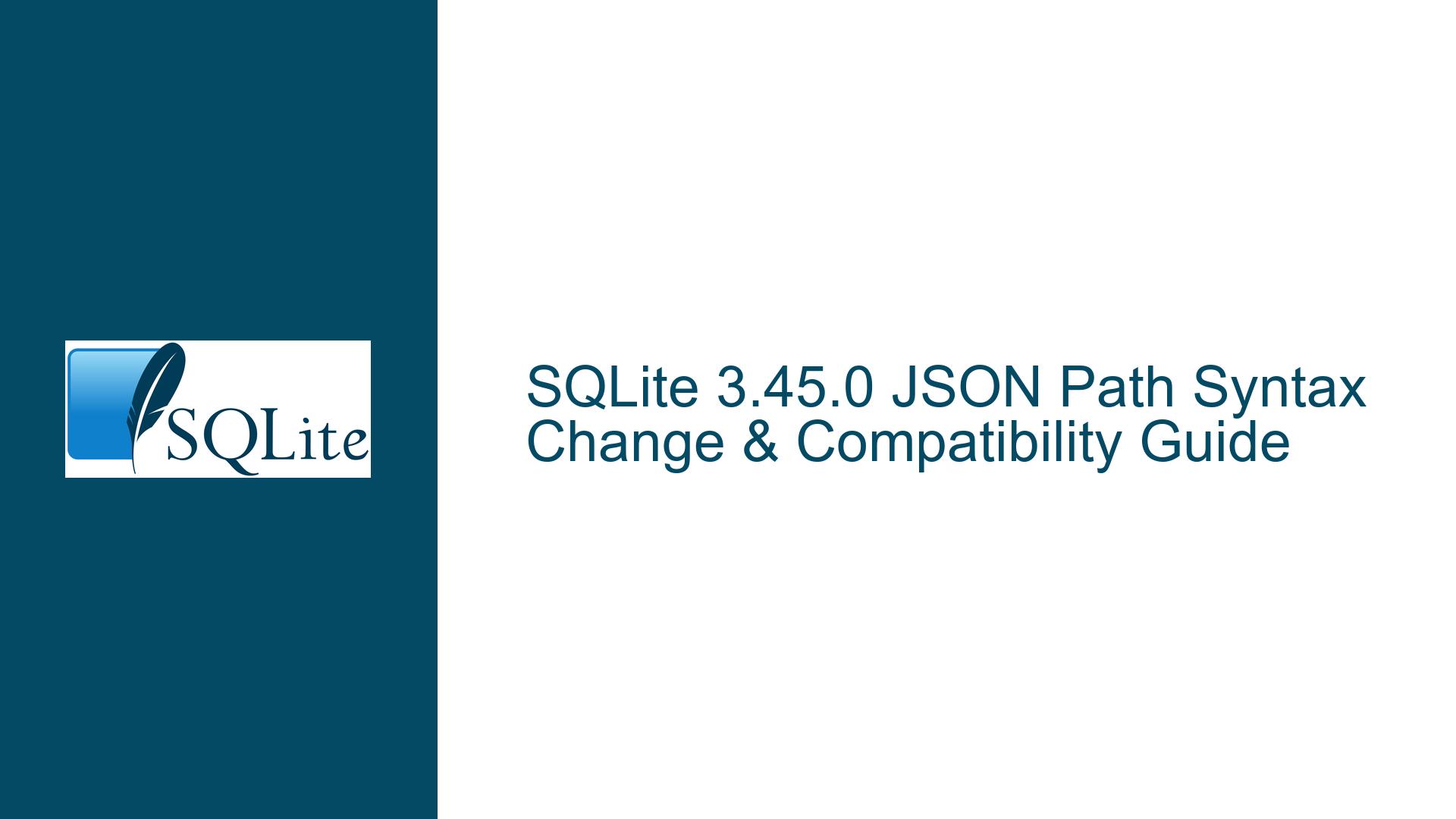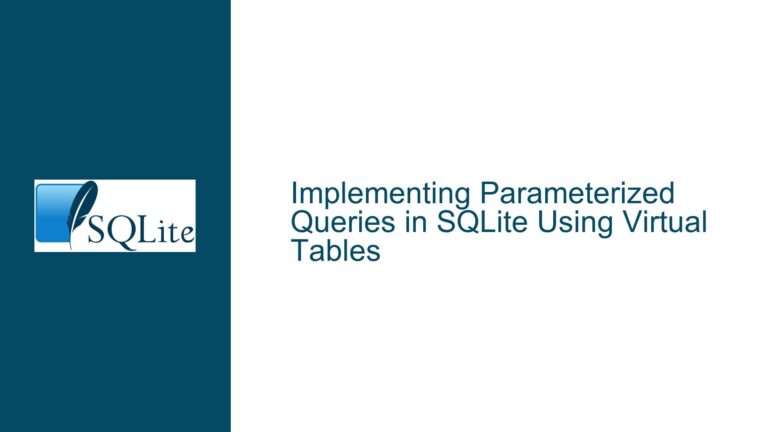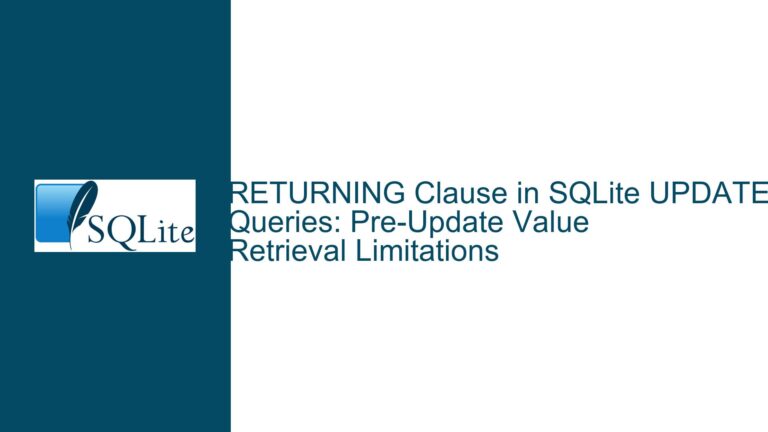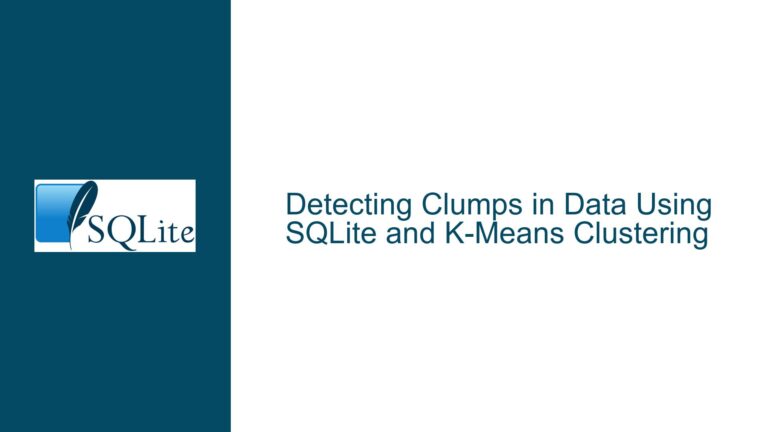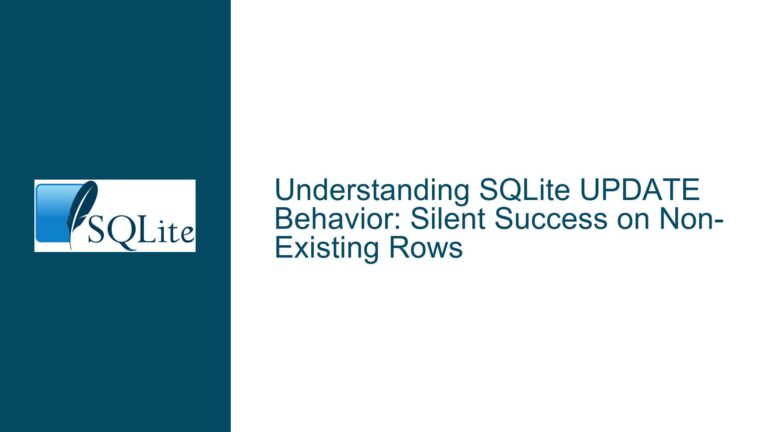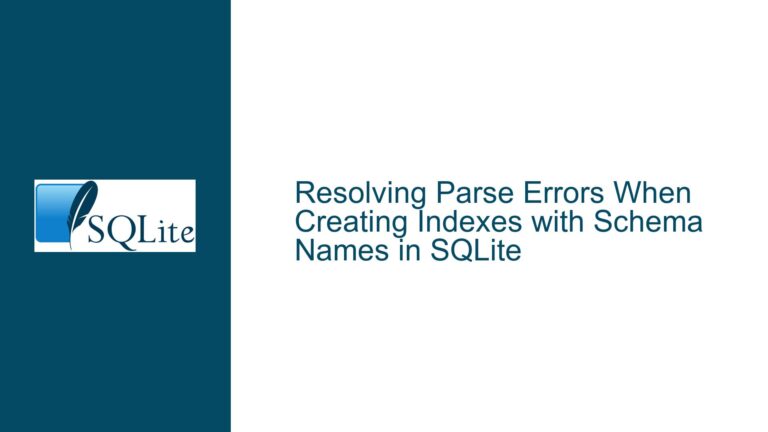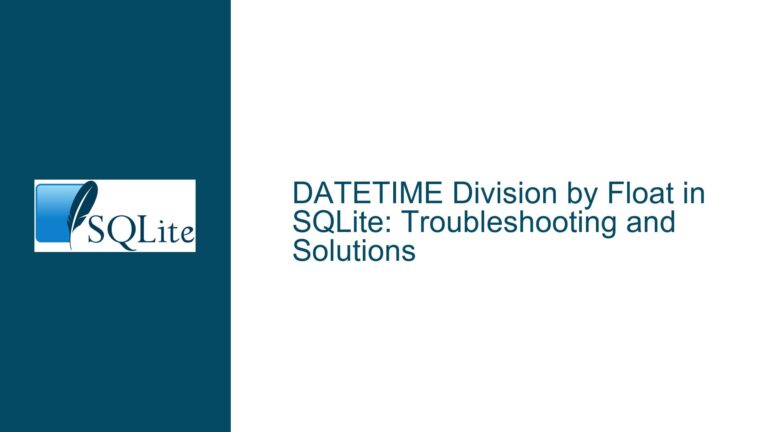SQLite 3.45.0 JSON Path Syntax Change & Compatibility Guide
JSON Path Parsing Behavior Shift in SQLite 3.45.0+
Understanding Syntax Requirements and Key Handling Differences
Issue Overview: JSON Path Interpretation Changes Between SQLite Versions
The fundamental change observed between SQLite versions 3.44.2 and 3.45.0 revolves around stricter enforcement of JSON path syntax rules in JSON functions like -> and ->>. Prior to 3.45.0, SQLite allowed abbreviated path formats that omitted the required $. root designation while still enabling navigation through nested objects. This lenient parsing led to inconsistent behavior when handling JSON keys containing special characters like periods (.), creating ambiguity between path navigation and literal key matching.
In SQLite 3.45.0+, the JSON engine was rewritten to use a new internal parse tree format, resulting in stricter adherence to RFC 9535 JSON Path syntax specifications. This manifests in two critical behavioral changes:
- Mandatory Root Designation: All JSON paths must now explicitly begin with
$.to indicate the root object. Paths like'a.b'that worked previously now returnNULLunless converted to'$.a.b'. - Special Character Handling: Keys containing periods (
.) now require explicit double-quoting within JSON paths (e.g.,$."a.b") to distinguish them from path navigation operators.
The practical impact appears when:
- Existing queries use implicit path syntax without
$.prefixes - JSON objects contain keys with special characters
- Applications rely on PostgreSQL-style
->operator behavior where paths could omit$. - Wrappers like better-sqlite3 upgrade underlying SQLite versions without query adjustments
Possible Causes: JSON Engine Rewrite and Syntax Standardization
Three primary factors contribute to the observed behavioral shift:
RFC 9535 Compliance
SQLite 3.45.0’s JSON engine overhaul prioritized compliance with the JSON Path RFC specification, which mandates explicit$root designation. Previous versions implemented a hybrid parser that allowed both RFC-compliant paths and PostgreSQL-style abbreviated paths. The updated engine eliminates this duality, requiring strict syntax adherence.Path Ambiguity Resolution
Keys containing periods created parsing ambiguities in older versions. For example,'a.b'could represent either:
- Navigation to child object
athen childb($.a.b) - Direct access to key
a.b($."a.b")
The new parser resolves this by treating unquoted.characters as path separators only when using RFC-style paths with$.prefixes. In PostgreSQL-compatibility mode (paths without$.),.is now treated as part of the key name.
- PostgreSQL Compatibility Layer Changes
SQLite maintains partial compatibility with PostgreSQL’s->and->>operators. In PostgreSQL:
column->'a'is equivalent tocolumn->'$.a'column->'a.b'is equivalent tocolumn->'$."a.b"'(direct key access)
Pre-3.45.0 SQLite implemented this compatibility layer but with flawed parsing logic that converteda.bto$.a.binstead of$."a.b". The engine rewrite fixed this discrepancy, making SQLite’s PostgreSQL-compatibility mode behave more authentically.
Troubleshooting Steps, Solutions & Fixes: Adapting Queries to New JSON Path Rules
1. Path Syntax Migration Strategy
All JSON path arguments must be audited and converted to one of two formats:
A. RFC-Compliant Paths (Recommended)
Add explicit $. prefixes and use proper quoting for special characters:
-- Before 3.45.0
SELECT value->>'a.b' FROM table;
-- After 3.45.0 (RFC-compliant)
SELECT value->>'$.a.b' FROM table; -- Nested access
SELECT value->>'$."a.b"' FROM table; -- Direct key access
B. PostgreSQL-Compatible Paths
Omit $. but understand key handling changes:
-- Before 3.45.0: 'a.b' parsed as $.a.b
-- After 3.45.0: 'a.b' parsed as $."a.b"
SELECT value->>'a.b' FROM table; -- Now accesses key "a.b" directly
2. Handling Keys with Special Characters
When JSON objects contain keys with ., $, or spaces:
Explicit Quoting in Paths
-- Access key "a.b" at root level
SELECT value->>'$."a.b"' FROM table;
-- Access nested key "c" under "a.b"
SELECT value->>'$."a.b".c' FROM table;
Array Indexing Compatibility
Mix quoted keys and array indices:
-- Access second element of array at key "a.b"
SELECT value->>'$."a.b"[1]' FROM table;
3. Version-Specific Query Handling
For codebases supporting multiple SQLite versions:
Runtime Path Generation
Dynamically prefix paths based on SQLite version:
const sqliteVersion = db.prepare('SELECT sqlite_version()').pluck().get();
const pathPrefix = sqliteVersion >= '3.45.0' ? '$.': '';
const query = db.prepare(`SELECT value->>'${pathPrefix}a.b' FROM table`);
4. Better-sqlite3 Specific Considerations
The JavaScript wrapper uses these version mappings:
- [email protected] → SQLite 3.44.1
- [email protected] → SQLite 3.45.0
Locking SQLite Versions
Temporarily pin the wrapper version while migrating:
yarn add [email protected]
5. Testing and Validation
Implement comprehensive JSON path tests covering:
- Nested object navigation with and without
$. - Keys containing
.,$, spaces, and Unicode - Mixed array/object traversal
- Comparisons between
->(JSON output) and->>(text output)
Example Test Matrix
SELECT
value->'a.b' as implicit_path,
value->'$."a.b"' as explicit_dot,
value->'$.a.b' as nested_path
FROM (SELECT '{"a.b": "direct", "a": {"b": "nested"}}'::JSON as value);
6. Migration Checklist
- Identify all JSON function usages (
JSON_EXTRACT,->,->>, etc.) - Verify path arguments start with
$. - Quote keys containing non-alphanumeric characters
- Update application logic handling key names with special characters
- Test with SQLite ≥3.45.0 and PostgreSQL side-by-side
- Deploy with SQLite version awareness in client libraries
7. Edge Case: Mixed Nested and Direct Key Access
When a JSON object contains both nested structures and top-level keys with .:
{"a": {"b": 1}, "a.b": 2}
Correct Post-3.45.0 Queries
-- Access nested value 1
SELECT value->>'$.a.b';
-- Access direct key value 2
SELECT value->>'$."a.b"';
-- PostgreSQL-style access to direct key (no $.)
SELECT value->>'a.b';
8. Performance Implications
The rewritten JSON engine in 3.45.0+ introduces:
- Faster parsing of complex paths
- Reduced memory footprint for JSON operations
- Consistent caching of compiled JSON paths
Benchmark critical JSON queries before/after migration to identify optimization opportunities from the engine upgrades.
9. Cross-Database Compatibility Patterns
For code targeting both SQLite and PostgreSQL:
Unified Path Syntax
-- Use $."a.b" syntax which works in both (PostgreSQL ignores $ but handles quotes)
SELECT value->>'$."a.b"';
Conditional SQL Generation
function jsonPath(key) {
if (isPostgreSQL) {
return `'${key}'`;
} else {
return `'$."${key}"'`;
}
}
10. Debugging Techniques
Diagnose Path Parsing Issues
Use JSON_TYPE to inspect intermediate results:
SELECT
JSON_TYPE(value, '$.a.b') as nested_type,
JSON_TYPE(value, '$."a.b"') as direct_type
FROM table;
Logging Actual Path Resolution
Wrap path arguments in JSON_EXTRACT for explicit error checking:
-- Will error if path syntax is invalid
SELECT JSON_EXTRACT(value, '$.invalid.path->>');
This comprehensive guide addresses the JSON path syntax changes through technical deep dives, practical migration strategies, and cross-version compatibility techniques, ensuring robust JSON handling in SQLite 3.45.0+ environments.
